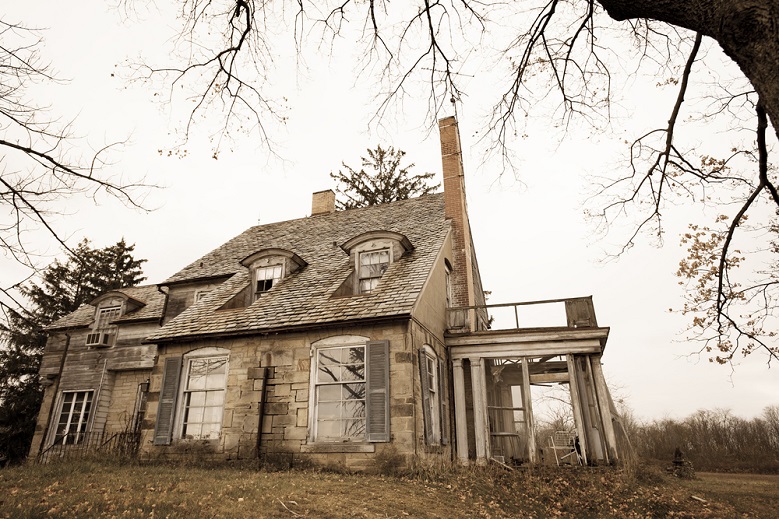
As Halloween approaches, images of ghosts, goblins, and witches are all around us in stores and homes all decorated for the holiday. While finding ghosts or other supernatural creatures is not usual in foreclosures, there are certainly a number of other “spooky” demons to be discovered in a home that has been neglected, abandoned, and sitting empty for years.
Today, let’s take a look at some common frightening items an unlucky investor might encounter in a recently purchased foreclosure, and how to handle them:
- Mold. Very few things frighten the average investor more than finding mold in a home, yet mold is quite common in vacant or neglected properties. Mold is most often caused by water intruding into the home, from a bad roof, leaky pipes or toilet, rusted water heaters, or refrigerator water lines. Mold such as green mold on the exterior siding is minor, and can easily be removed with pressure washing. Other times, mold is more extensive and on the interior. I have seen flooded homes with mold several feet up the interior walls.
But don’t let mold scare you off to a potentially great deal. Rick Sharga, Executive Vice President of online real estate marketplace Ten-X.com, notes that homes with mold tend to sell at bargain prices, and a seasoned investor can benefit from the greater equity. A professional home inspector can assess the extent of the mold and provide suggestions on how to eliminate the problem. The usual treatment involves the removal of sheet rock, and treating the wall studs and other areas with bleach or other anti-mold products. If the mold is extensive, the investor should have a professional remove the mold from the home.
- Termites. Another common problem found in many areas of the U.S., and particularly in neglected homes is termites. Just the word itself terrifies many new investors. But standard treatments for termites are highly effective in stopping them before they eat up your investment.The bigger problem is assessing whether there is minor or major damage already. A professional pest control company can help answer that question. Many times, the damage done can be repaired inexpensively. As with mold, termite damage is often obvious, and homes with visible signs of termites tend to sell for far less, making the savings greater than the cost to eradicate the problem. Don’t let termites haunt you!
- Rodents, snakes, and other pests. On two separate occasions, I have encountered snakes in the garage of a foreclosed home. That was frightening, but fortunately the ghouls left soon after we opened the garage door. Watch out for snakes in homes where wood or other debris is piled up in a backyard. Removing the debris usually solves the problem.One time as I walked through an old Victorian style home with a home inspector, he turned to me and said, “Listen….do you hear that in the attic?” It was the sound of rats scurrying about. Yes, it was creepy for sure. But as with termites, a good pest control company can eradicate the problem, and there are things you can do to keep these critters away from the home.
- Severe Plumbing Problems. This issue is less common today than it was between 2007-2010, when angry homeowners who were being foreclosed on often vandalized their homes on the way out. One common “trick” was pouring cement down the toilet, sinks, or bathtub, and then trickling water after it until the cement hardened. Residue from cement can often be seen in or around the fixture. But other less severe plumbing issues, such as leaks, or lack of pressure are often common in foreclosures as well.Don’t panic. If the home has working utilities, test all of the water sources thoroughly before you purchase it. If the water is off, have a plumber or home inspector perform an air pressure test to at least check for leaks in the home.
- Squatters or burglars in the home. Now this is scary. An investor I know caught someone “squatting” in his empty home, and had to call the police to have him removed. It’s also common for burglars to break in to empty homes. One inexpensive deterrent is to ask a neighbor to park on your driveway, and you should also leave interior lamps on a timer at night. If the home already has a security system, the investor may want to get connected to a local alarm company.
- Stolen Heating and Air Equipment. When copper was more expensive, this problem was more common, as thieves would steal the outside units and lines for the metal. But vindictive homeowners have been known to remove the inside heating and air units as well prior to leaving. While replacements are expensive, banks often drop their price on these homes to compensate investors. There is no reason to be frightened off by missing systems, but certainly do a cost analysis prior to making your offer.
- Chinese Drywall and other defective materials. Defective Louisiana Pacific siding was a huge issue in the 1990’s. Chinese drywall was an even spookier problem encountered in some foreclosures built between 2001 and 2009. Remediation of the interior walls, as well as other affected systems of the home was quite expensive. In recent years, the number of foreclosures affected by Chinese drywall has dropped markedly. These homes are often sold way below market value, making them opportunities rather than demons to be avoided.
- Non-permitted work. Anytime the structure of a home is modified, such as a new roof, addition, or garage enclosure, a permit needs to be pulled by a licensed contractor. When you purchase a foreclosure to flip where permits have not been pulled, it can scare would be buyers off, or the work may not have been performed to local codes. Once more, a good home inspector can usually spot non-permitted work, and you can check the residential permit records of most cities on line.
- No electricity. In some areas, the local electric company may mandate that an electrical inspection be performed before they will allow you to turn the electricity on in a vacant home. The cost of such inspections is not egregious, but you may want to call the electric company prior to making your offer to determine if this is the case.
- Missed liens. If a lien has been missed during the title work, it can be quite nerve wracking to an investor to discover this after closing. However, if you have purchased owners title insurance, the insurance will pay off on the missed lien. Investors who purchase foreclosures at county auctions need to have a local title company do a lien search prior to the auction on properties of which they have interest.
So the bottom line is, while many things about a foreclosure may seem frightening, there are common remedies to most all the problems you will encounter, with the help of licensed inspectors and contractors.
Happy Halloween!
About the Author:
Ethan Roberts is a real estate writer, editor and investor. He’s a frequent contributor to InvestorPlace, and his work has been featured on MSN Money and Reuters. He’s also written for Seeking Alpha, Investopedia, The Fiscal Times, ForSaleByOwner and Smarty Cents, and was one of five contributing editors to The Tycoon Report. He’s been investing in real estate since 1995 and has been a Realtor since 1998. He also teaches classes on investing in residential real estate.

